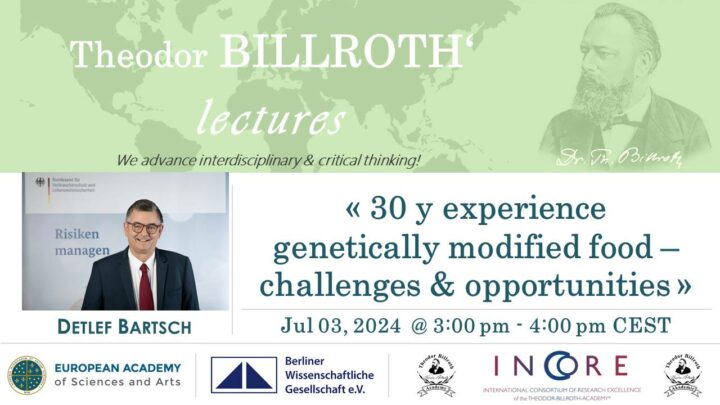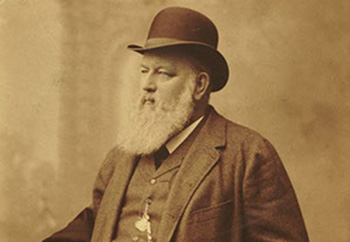30 years experience of genetically modified food: Challenges & opportunities
Speaker
Prof. Dr. Detlef Bartsch
Detlef Bartsch is the Head of the Department 4 (Genetic Engineering and other Biotechnological Processes) (Abteilung 4: Gentechnik und weitere Biotechnologische Verfahren) of the German Federal Office for Consumer Protection and Food Safety (Bundesamt für Verbraucherschutz und Lebensmittelsicherheit) in Berlin, Germany.
Professor Dr. Detlef Bartsch graduated after studying Biology at the Universities of Münster and Göttingen, each Germany, with his Diploma Thesis in Plant Ecophysiology at the Georg-August-University Göttingen, Germany, followed by his PhD in Ecological Botany at the Georg-August-University Göttingen, Germany. Afterwards he was Research Associate at the Technical University of Berlin, Germany for Ecology, followed by serving as Research Associate at the Chair of Ecotoxicology and Ecochemistry V at the RWTH University of Technology, Aachen, Germany from 1992 to 1997. Here he served also as the Chair of the “Terrestrial Ecology” working group within the framework of biological safety research on genetically modified plants. From 1997 to 1999 Bartsch was Visiting Scientist at the renewed Department of Botany & Plant Sciences, University of California, Riverside, California, USA. This included scientific work on population genetics. Coming back from the US, Prof. Bartsch worked as a scientific assistant and finished his Habilitation including receiving his license as lecturer for Botany, on environmental monitoring of genetically modified plants, RWTH Aachen University of Technology), Aachen, Germany. Afterwards Prof. Dr Detlef Bartsch was scientist at the highly recognized Leibniz Centre for Agricultural Landscape Research (Leibniz-Zentrum für Agrarlandschaftsforschung, ZALF), Müncheberg, where he established a working group “Biosafety research and long-term monitoring in agricultural ecosystems”, Müncheberg, Germany in 2002. He became Deputy Head of the Center for Gene Technology at the Robert Koch Institute, Berlin, Germany from 2002 to 2003. Professor Bartsch was appointed external expert of highly recognized Scientific Societies and of the European Food Safety Authority (EFSA), Parma, Italy. Prof. Dr. Detlef Bartsch chaired the important EFSA working group establishing “Guidelines for the Environmental Risk Assessment of Genetically Modified Plants” from 2008-2010. Serving first as the Head of the unit ‘Coexistence and GMO Monitoring’ at the German Federal Office for Consumer Protection and Food Safety (Bundesamt für Verbraucherschutz und Lebensmittelsicherheit, BVL), Berlin, Germany from 2004 to 2015, Professor Bartsch was appointed in 2007 appointed Scientific Director at the German Federal Office of Consumer Protection and Food Safety (Bundesamt für Verbraucherschutz und Lebensmittelsicherheit, BVL), Berlin, Germany and received his Professorship in the same year at the RWTH Aachen. From 2010 to 2015 Professor Bartsch served as Commissionary Director of the Department 4 “Genetic engineering” ” of the German Federal Office for Consumer Protection and Food Safety (Bundesamt für Verbraucherschutz und Lebensmittelsicherheit, BVL), Berlin, Germany.
Since Jul 01, 2015, Professor Bartsch was appointed in Jul 01, 2015, to serve as Director and Professor of the German Federal Office for Consumer Protection and Food Safety (Bundesamt für Verbraucherschutz und Lebensmittelsicherheit, BVL), Berlin, Germany. Under his supervision, the department examines and decides application for the release of genetically modified organisms (GMO) for scientific experiments under the moto “genetic engineering – check carefully, approve safely”. With his department, Bartsch advises scientists and the Federal German Government and the Federal States on the safety assessment of genetic engineering work in genetic engineering laboratories and in experimental field trial. He also gives recommendations on the necessary safety measures to protect people, animals and the environment. Professor Bartsch published very well and is also serving as CEO of the learned society, the Berlin Scientific Society “Berliner Wissenschaftliche Gesellschaft (BWG)” in Berlin, Germany. In 2023 he was elected as ordinary member to the European Academy of Sciences and Arts (EASA)

AGENDA
The presentation starts with an overview on the Federal Office for Consumer Protection and Food Safety, followed by explaining the role of human values, social acceptance, technological feasibility and regulatory encouragement on innovation. The past 30 years of experience in biosafety research on genetically modified organisms and their derived food and feed is summarized. Finally, an outlook is given on the actual state of discussion about GMOs worldwide with specific emphasis on legal harmonization activities.
LEARNING OUTCOMES
- The comparative approach is a basic internationally agreed basis for any scientific safety assessment.
- Innovation is dependent on human values, social acceptance, technological feasibility and encouraging regulation.
- Worldwide harmonization of regulation is key to address global change challenges.
"Our responsibility is, to the extent of our view into the future, to form the present felicitous for the next generation according to the best of our knowledge and belief”
Theodor Billroth (1829-1894)

